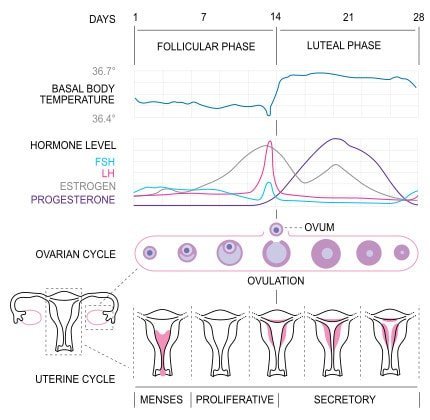On average, girls get their first period between the ages 11 to 14. Medically termed as the “menarch”, it is socially and medically considered as the central event of female puberty.
When the first menstrual period occurs, it often signals the possibility of fertility. This is a time when female sexual characteristics will have developed such as budding breasts, pubic hair, and many others.
Body Changes due to Menstruation
Once a girl starts to menstruate, the body goes through a lot of changes. There are times when it gets confusing and overwhelming but it’s all just part of growing up.
This is why it’s important to know what goes on the female body’s regular menstrual cycle. The more you know what usually goes on in your body, the better it is for you to understand that these changes are normal.
Preparing for Menstruation
Besides that, it usually helps when you know what to expect or to prepare for throughout the cycle. While there are a lot of applications like menstrual cycle calculators or flow trackers, that will guide and help a person track their own menstrual cycles, it’s still better to know the basics of it.
If you’re looking for an extensive and detailed guide to menstrual cycle phases, then you have come to the right place. Let’s break down each cycle, shall we?
Menstrual Cycle Phases
The average regular menstrual cycle lasts about 28 days. In one cycle, there are four different phases.
These are the following:
- Menstrual phase
- Follicular phase
- Ovulation phase
- Luteal phase
Each phase presents different characteristics that describe what goes on in the female’s body. Each section describes what your body goes through, what to expect and prepare for in each phase.

Menstrual phase
The first day of menstruation begins the female body’s menstrual cycle. When the thickened wall in your womb eliminates blood through the vaginal canal, that’s when the menstrual phase starts.
The average period of the woman’s menstrual phase lasts for about three to seven days. Here are the things you should expect during this period:
Both mucus and blood which constitutes the menstrual fluid exit the uterus to the vaginal canal. During this phase, the female uses sanitary pads, tampons, or menstrual cups in order to absorb the flow.
Amount of Blood Loss
In one period, blood loss between 10ml to 80ml is considered normal. You may consult your OB-GYN if heavy flow concerns you.
Abdominal cramps caused by the contractions of both the uterine and abdominal muscles when expelling the menstrual fluid is expected to be one of the most common symptoms that the female body experiences.
What to expect and prepare for:
Be mindful of the products that you use. Tampons have been associated with a rare illness called Toxic Shock Syndrome or TSS.
Always change your pads or tampons regularly. It is advised that these products be changed every four hours.
Look for therapeutic ways to alleviate menstrual cramps. Some cases can be too much for one to bear.
Follicular phase
This phase happens when the hypothalamus prompts the pituitary gland in order to release the follicle stimulating hormones. This will then stimulate the woman’s ovary to start the growth of five to 20 follicles.
These follicles will then each house an immature egg. Among them, only one follicle matures to become an egg while the others die.
The follicular phase begins on the first day of the menstrual phase and usually ends on thirteen days after. The growth of these follicles also prepares the uterus lining once more during the woman’s fertile period.
What to expect or prepare for:
The single follicle usually matures on the 10th day since the beginning of the follicular phase.
As the egg matures, the follicle secretes a hormone that stimulates the lining of the womb to develop the endometrium.
Ovulation Phase
The regular menstrual cycle reaches its ovulation phase usually on the 14th. As this happens, the egg cell then travels to the fallopian tube.
When this phase begins, the pituitary gland secretes a hormone called the luteinizing hormone or LH together with the follicle secreting hormone (FSH). This will cause the release of a matured egg (Ovum) from the ovary.
What to expect or prepare for:
A mature egg, once it funnels to the fallopian tube, will typically have a lifespan of about 24 hours. Beyond that, it will die unless it meets a sperm.
There is an increased chance of pregnancy during this phase. Therefore, it will help a lot if you recognize when the “fertile window” happens during a woman’s cycle.
It pays to know more about the ovulation phase especially if the woman and her partner are trying to get pregnant. There are fertility calculators or menstrual trackers that will guide you.
Luteal Phase
The final menstrual cycle phase is called the luteal phase. It usually begins on the 15th day and will go on until the end of the cycle.
When this phase occurs, there are two situations that could happen. Either the woman gets pregnant, which is definitely possible especially when one is sexually active, or the cycle continues to prepare for a new one.
What to expect and prepare for:
If pregnancy happens, the fertilized egg implants in the uterus lining. Whenever this is the case, the implanting embryo produces the necessary hormones that are needed to maintain the corpus luteum.
One of the hormones responsible for maintaining the corpus luteum is the Human Chorionic Gonadotrophin (HCG) hormone. This is the main indicator of a positive pregnancy test.
What happens upon pregnancy?
If the female body is pregnant, the corpus luteum will then continue to produce high levels of progesterone. Such hormone production is needed in order to maintain the lining’s thickness and keep uterus quiescent, which is important as the baby grows inside the mother’s womb.
If pregnancy does not happen, the corpus luteum withers to continue the regular menstrual cycle. This usually happens on the 22nd day of a regular 28-day cycle.
As the body gears up to a new menstrual cycle, the progesterone level drops. This allows the uterus lining to fall away and the menstrual fluid exits the body and officially starts the new menstrual phase.
Conclusion
Keep in mind that not everyone goes through regular menstrual cycle phases. Some even have greatly abnormal cycles.
However, these should not be a cause of panic. The best thing that you could do is to consult the best opinions of a fertility expert or an OB-GYN.
These pieces of information are your key to understanding your body better. This way, you would be able to know how to address any concerns that may arise along the way. After all, you owe your body the best care it deserves.




I had my first period at march 07/19 and another one on march 28/19 I don’t know when this month period will come am confuse and even had sex on 05/04/19
Hello Ruth, click here to calculate your cycle and safe days.
hi my last period date was on 9 June 2018 and on the 1st of July i had an unprotected sex and now m one week late with my period. is the possibility that i might be pregnant?
Hi Sarah, that wasn’t during your fertile period. Have you had any other changes in your life or stress, medications, etc? Have you taken a pregnancy test?
my last period was june 11, 2018, lasted for 4-5 days. we made lone june 29-30, 2018 and July 1-2, 2018. am I pregrant now?
Hi Marie, those dates didn’t fall during your fertile period however, that being said, have you gotten your period or taken a test. I would recommend that.
I had sex April 7 /9 /11 do I get pregnant